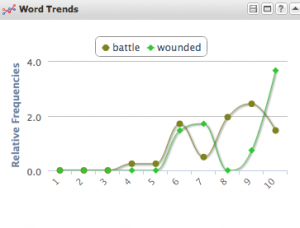The two words that I picked to look at were wounded and battle. I wanted to pick words that would reflect his feelings during battle and would show if the way that he talked about the battles changed overtime. Instead of picking random words, i wanted to find words that had some sort of connection, and i found that wounded and battle seemed like they could possibly have some beneficial links. When i continued to look closer, it was obvious that a link was present.
The graph above shows the number of appearances of both of my words in the progression of his writings. The second half of his writings had dramatically more appearances of both of the words. Actually, wounded does not show up once in the entire first half of the writing, but shows up thirty four times in the second half. Battle is also used drastically more often in the second half than in the first. For me the connections between the appearance of these words could show a change in Linn. Both of the words that i picked are connected to pain, war, and conflict so i would assume they would led to a change in the way that Linn sees that. His time spent in the war made him hard, resulting in the loss of innocence which in turn led to the change in the way that he writes and what he chooses to write about.
I also found it interesting to look at the words that were connected to battle and wounded in the Links tool. They were both connected to the word company, which comments that he was often talking about his solider companions when discussing battles and the wounded. The words left, exhausted, and killed were also all in this cluster. These words all have some connotations that could play a part in Linn’s transformation. Although i would say a deeper look might be required to make a strong conclusion about his change, my dive into these two words seemed to fit that conclusion.



